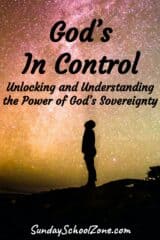God Is in Control: Part 1
 Unlocking the Mystery of God’s Sovereignty
Unlocking the Mystery of God’s Sovereignty
What Joseph’s Life Teaches Us About an All-Powerful God
Part 1: Principles We Can Observe
When Joseph revealed his identity to his brothers, he spoke with sincerity and eloquence about God’s role in bringing him to the position where he now served. He “said to his brothers, ‘Please, come near me,’ and they came near. ‘I am Joseph, your brother,’ he said, ‘the one you sold into Egypt. And now don’t be worried or angry with yourselves for selling me here, because God sent me ahead of you to preserve life. For the famine has been in the land these two years, and there will be five more years without plowing or harvesting. God sent me ahead of you to establish you as a remnant within the land and to keep you alive by a great deliverance. Therefore it was not you who sent me here, but God. He has made me a father to Pharaoh, lord of his entire household, and ruler over all the land of Egypt’” (Gen. 45:4-8). One of the most important statements in these verses is Joseph’s insight that “it was not you who sent me here, but God” (v. 8). Looking at Joseph’s life, let’s make several observations that can help us gain greater understanding of God’s sovereignty. Remember that God’s being sovereign means that all things are in His control.
- God planned for Joseph to rise from slave and prisoner to national leader, even from the beginning. We see this in Joseph’s dreams, which occurred years before they were fulfilled (see Gen. 37:5-10).
- God used evil intentions and even evil deeds to bring about the outcome He desired. This is not to say that God approved of the mistreatment Joseph received or that He was a party to it, but it is to say that God can and does bring about the results He desires, regardless of the details of the circumstances.
- In Joseph’s case, the journey was difficult for many, including Joseph; yet the end result was wonderful for many more.
- Although Joseph surely had questions relating to the injustices he had experienced (see Gen. 40:14-15), we see no evidence that God offered Joseph any explanations. Had he done so, He would have mitigated Joseph’s need to trust Him on a daily basis. The Lord did, however, give Joseph His blessing as Joseph honored God in the midst of the challenges and injustices he faced (see 39:2-6;21-23).
- Joseph was misunderstood and was falsely accused, yet he clearly grew and matured through the hardship he experienced. Also, his faith in God clearly increased.
- God could have intervened and brought about many of the results He wanted without Joseph’s help, but He chose to use Joseph and others in implementing His plan. As the plan unfolded, many who looked at Joseph’s life got to see the benefits of trusting and honoring the Lord, despite hardship.
- God not only had the big picture in mind (that of meeting the needs of people and nations during a devastating famine), but He also had the bigger picture in mind as well (that of bringing His people to Egypt and allowing them to be oppressed for many years, then dramatically rescuing them from bondage and bringing them to the land He had promised Abraham). In acting as He did, God provided a vivid portrait of His ultimate plan of rescue, that of freeing people from sin’s bondage through the death of His Son (see Exodus 12).
“OK,” someone might say. “That was all well and good for Joseph, but what about believers today? What about me?” Of course, we must be careful not to assume too much as we examine Joseph’s life to gain insights about how the Lord works today. Every believer’s situation is unique. Still, we can see a number of principles at work in Joseph’s life that relate to us. God does not change but remains the same “yesterday, today, and forever” (Heb. 13:8). In part 2, we’ll examine each of the observations we made concerning Joseph and consider whether or not it reflects a truth on which we can rely today.
B. Nathaniel Sullivan
Christian educator, Bible teacher, and Editor
Unless otherwise noted, all Scripture quotations in SundaySchoolZone.com materials are taken from the Holman Christian Standard Bible®, Copyright © 1999, 2000, 2002, 2003, 2009 by Holman Bible Publishers. Used by permission. Holman Christian Standard Bible®, Holman CSB®, and HCSB® are federally registered trademarks of Holman Bible Publishers.



